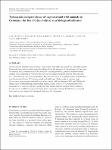Tularaemia seroprevalence of captured and wild animals in Germany: the fox (Vulpes vulpes) as a biological indicator
Kühn, Andrea
Schulze, C.
Kutzer, P.
Probst, C.
Hlinak, A.
Ochs, A.
Grunow, Roland
A total of 2475 animals from Germany, both captive and wild, were tested for antibodies against Francisella tularensis to obtain more knowledge about the presence of this pathogen in Germany. An indirect and a competitive ELISA served as screening methods, positive and inconclusive samples were confirmed by Western blot. Of the zoo animals sampled between 1992 and 2007 (n = 1122), three (0·3%) were seropositive. The seroconversion of a hippopotamus in Berlin Zoo was documented. From 1353 serum samples of wild foxes (Vulpes vulpes), raccoon dogs (Nyctereutes procyonoides) and wild boars (Sus scrofa), collected between 2005 and 2009 in the federal state of Brandenburg (surrounding Berlin), a total of 101 (7·5%) tested positive for antibodies to F. tularensis lipopolysaccharide. Our results indicate a higher seroprevalence of F. tularensis in wildlife in eastern Germany than commonly assumed. Furthermore, we found foxes and raccoon dogs to be biological indicators for tularaemia.
Dateien zu dieser Publikation
Keine Lizenzangabe

